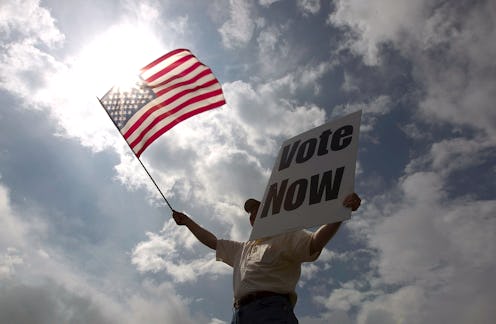
A recent law against crossover voting in the state of Alabama may become a source of legal tension for voters in the future. Reports indicate that the Republican Secretary of State John Merrill wants almost 700 Alabama citizens to be charged with voter fraud, a Class C felony, for crossing party lines in this year's primary and runoff elections. But voting experts say Merrill's move could hurt Alabama voters in the long run.
Merrill's office reportedly intends on giving the list of 674 citizens that it found in violation of the state's crossover law to local prosecutors. The law was just signed in May this year, and it prohibits crossing party lines. This means that Alabamians who voted for one party in the primary are not allowed to vote for another party in the runoff election.
Joyce White Vance, a law professor at the University of Alabama, tells Bustle that people aren't necessarily aware of the state's new rule, which she believes is a significant problem for officials to look into.
This is a new rule in Republican primaries that changes years of what people are used to ... There should be an extensive effort to educate people about what isn't permitted and even more importantly what is still permitted. Otherwise, the action of [Merrill] referring cases for prosecution may keep people from voting lawfully out of fear that they could face prosecution.
Vance describes Merrill's position as "highly problematic" and says that such a list could encourage a "type of voter suppression, especially with Alabama's tainted history." The law professor notes that elected leaders "should take special care to educate about any changes in the law."
In spite of calling for an investigation, Merrill is not the prosecutor, and he makes it a point to clearly state so. "We know that at least 674 people were folks who actually voted Democrat in the primary and then they voted in a Republican runoff," he tells Bustle. "We got that list of names and we've taken those names and we have actually sent them to the local probate judge."
"We've asked the local probate judge to vet those names and determine whether or not those people did that knowingly and willfully," Merrill says. If those people did indeed violate state law, they face a hefty fine of up to $15,000 and potentially five years in prison.
But observers are wary of Merrill's list of names. Marissa McBride, executive director of the Voter Participation Center — an organization focused on civic engagement and voter rights — tells Bustle it is "unconscionable" that elected officials are putting up barriers to keep people from voting.
"This is yet another example of elected officials trying to rig the system in favor of the powerful," she says.